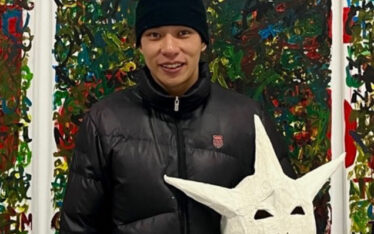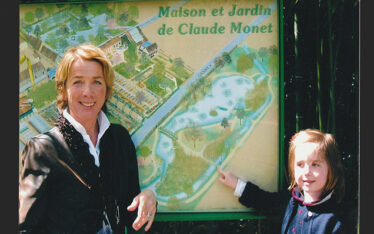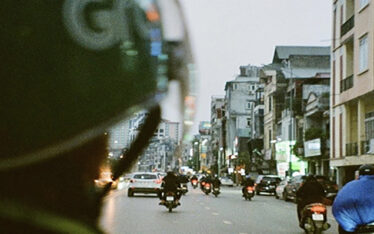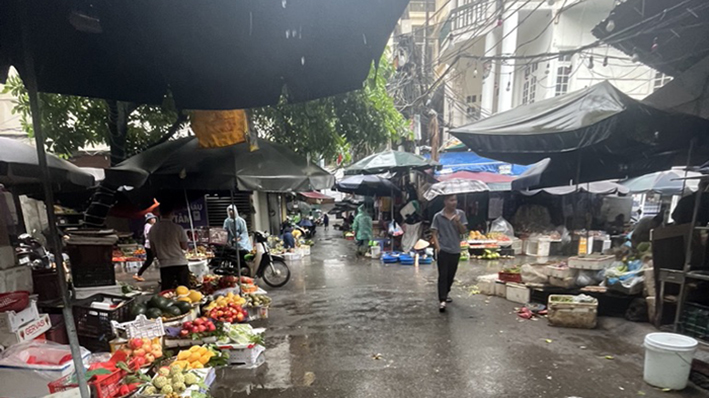
Hanoi: street market in the rain
Time never rests. We sleep, it doesn’t. Its readout varies. With where we are. The image we see one moment is totally dependent on our state of mind. On what we’re thinking. Each of us may view the exact same object at the exact same moment but see it through a totally different lens. Take nothing for granted. Life is ever evolving.
Two months ago, my daughter Caroline took off for Vietnam, heading there to research Hanoi’s emerging alternative art community and how it’s reshaping the city’s cultural landscape through bottom-up efforts. Excited by the prospect of moving to Hanoi for a year, she settled half-a-world away from L.A. Not surprisingly, her life bears little resemblance to mine when I was her age. Practically the only Americans visiting Vietnam then were in military uniform. The U.S. and Vietnam had been caught up in a brutal idealistic war with no end in sight. The Viet Cong, led by Ho Chi Minh based in the north, had sought to liberate the south and put an end to colonialism on its shores. The U.S. and South Vietnam, on the other hand, had joined forces to stop what had been thought of as the cancerous spread of communism on the mainland of Southeast Asia.
Today, especially after President Biden having just visited, Vietnam has not only become a major economic trade partner for the U.S. but one of the most desirable destinations, topping contemporary wish lists for travel. Vietnamese beaches are like none other in the world. Its mountains breathtaking. The countryside lush. In the 1960’s, American soldiers were not tourists. Our young men were drafted and sent there to kill people. Not to admire the landscape. Not to discover the Vietnamese narrative. Nor could they. The countryside was being burned and cleared. Not cherished. Locals, whether Viet Cong or otherwise, were mercilessly slaughtered by our troops. Mai Lai was a massacre like none before. If only, we could have seen things then as we see them now. If only we could have seen things through local eyes. But all the atrocities against the Viet Cong only increased local support for them and made them even stronger.
When I was a young man growing up in New York, the city, home to the U.N., was globally acknowledged as an unofficial center of the universe, heralded as the melting pot of America. The Statue of Liberty held her torch high over the harbor to welcome one and all. Emma Lazarus’ immortal words rang out: “Give me your tired, your poor, your huddled masses yearning to breathe free.” Three time zones away, on the opposite coast, Los Angeles regularly peered through a blanket of smog to champion beauty, film stars and studios. There, air, defense and auto industries led the unbridled growth. Today, it’s tech, tech, tech!
In the 1960s, as war raged across the Pacific, a sea of metal flooded California freeways with cars everywhere as a wave of pop music spun skyward: sunglass-adorned white faces emphatically nodding to the beat. Automobiles ruled. Other surface transit had begun to vanish. Train travel diminished. Tram tracks were paved over in black. Buses grew old and tired. No replacements in sight. Choked by fossil fuel companies, mass transit struggled to survive. Definitely not part of “California Dreamin'”. [1]
On the opposite coast, people riding the subways to work, each clung, with one hand, to a dangling ceiling strap and read the daily newspaper which was tightly clutched and folded vertically in four. From Wall Street to the U.N., towering skyscrapers dotted the Manhattan landscape. Fans packed smoke-filled jazz clubs in Greenwich Village as audiences applauded hit shows both on and off Broadway, the best live theater anywhere.
The law required guys on reaching eighteen to register for the draft. Some, wanting to resist, fled the country seeking refuge in Canada or Sweden. Many more immediately sought ways to get a deferment. Some were 100% legit. Others increasingly less so. Staying in school, going to university and then graduate school was the best. At the same time, many simply opted to volunteer. Better to go of your own accord. More dramatic were the ones who chose to assume symptoms of a non-prevailing medical condition. Or even worse, those who chose to self-inflict a critical bodily injury. It was not unheard of to self-mutilate. I knew guys who either cut off or shot off a finger or toe. Almost impossible to believe that getting drafted and shot at in Vietnam could ever be considered worse. The good news was you needed your draft card to get into a bar. Without it, you couldn’t drink. Just proves there are two sides to everything. And as Bob Dylan said in his lyrics: “The Times They Are a Changing.”[2]
Too bad, politicians today no longer pursue a bipartisan path and genuinely work for the benefit of the country. In the ’90s, by contrast, Republican Senator Orrin Hatch of Utah and Democratic Senator Edward Kennedy of Massachusetts: a classic conservative and a classic liberal openly worked together. Their joint efforts even got a bill passed to raise $30 million that covered half the cost of children’s federal health insurance. An example of how legislators set aside their differences, joining forces with colleagues from across the aisle to enact historic legislation. Unfortunately, such practices have long given way to adherence to hardline positions.
Today, the sole aim of so many politicians is simply to get elected or reelected. Neither ideas, policy nor platform ever enter the equation. Embracing the grotesque, if it means winning, has become the norm. Far too many politicians get far more satisfaction preventing members of the opposition from getting their legislation passed than from achieving their own goals. Political gridlock has elbowed its way in to establish a permanent home in Washington.
In the 1960’s anti-war protests were massive. Tens of thousands of young people took to the streets every week in every major city, marching, chanting, and spreading the word. However, no one saw or met with the Vietnamese people. No one heard their voices. Pursuing the true tradition of colonialism, American leadership spoke and simply assumed that what they believed was good for them would be good for the other side as well. No one bothered to give it a second thought. Eyes were “Wide Shut”. Unforgivable atrocities occurred. An incredibly beautiful country filled with loving people was bombed and burned. People’s lungs sucked in air filled with chemicals. Pure napalm. Americans didn’t seem to care.
Instead of Americans civilians voluntarily visiting Vietnam, appreciating what was naturally beautiful there, the people, their culture and the landscape, and Vietnamese civilians being able to travel to America to do the same, showers of horrific napalm randomly rained down. Black market and defense industry profits soared. All the while the misguided war raged on. Body bags were piled on an assembly line to be opened, filled, zipped and shipped home. Human life tragically had lost all value.
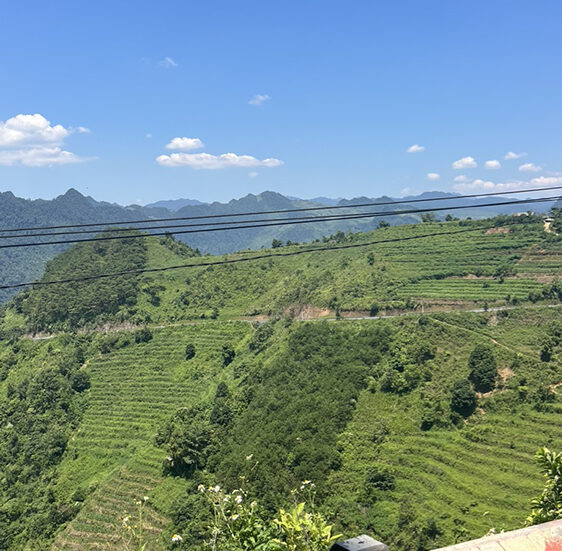
Terraced green hillside
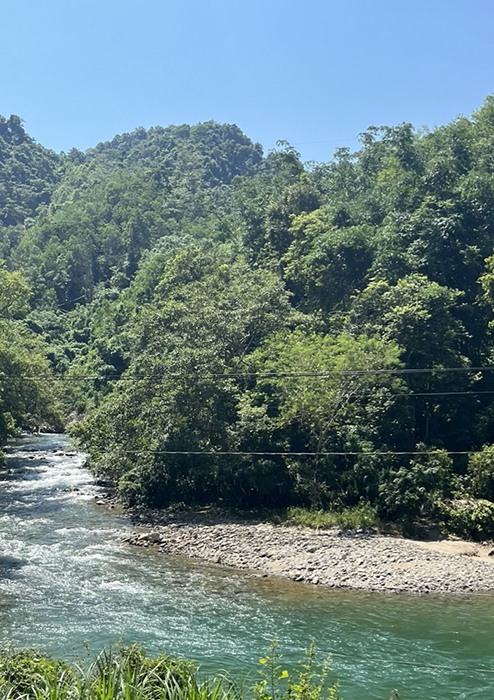
River raging downstream
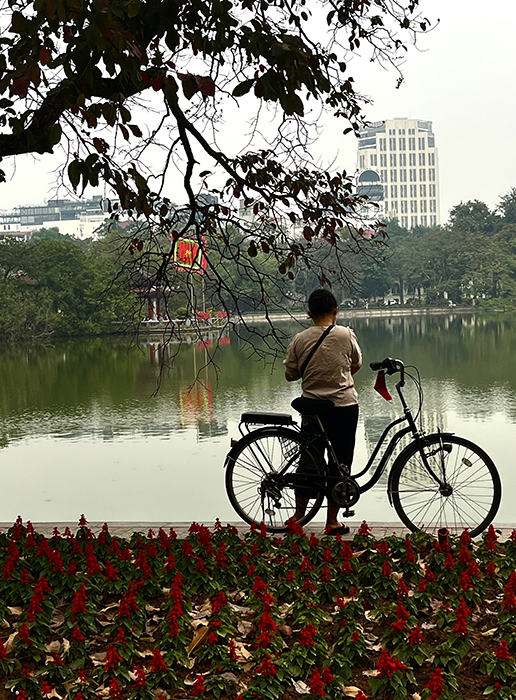
Bicyclist paused by reflections in the lake
Perhaps possessing a dose of intergenerational amnesia, the Vietnamese today warmly welcome American visitors to at least to spend plenty of hard dollars. They accept nothing to gain by looking back. Consciously or subconsciously, they prefer to encourage economic growth and move forward. Whatever hatred they might bear doesn’t show. Considering all the destruction their parents, grand parents, friends and families lived through, we should learn from them and gain the strength to also move forward. We need to encourage others to thoughtfully understand and follow suit.
In 1971, I helped produce a rock festival headlining blues legend B.B. King. He performed in Placitas, New Mexico, a site in the desert outside Albuquerque. The people there wore tie-dye and denim. Some sported toothy smiles but all were super friendly, handing out endless sandwiches and beverages. Cotton candy clouds sailed off. The air left deliciously clear.
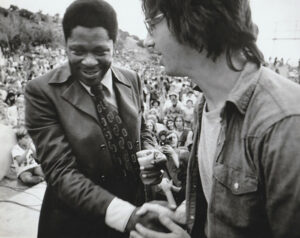
1971 Placitas, NM: BB King live
Seconds later, fresh clusters of dark gray rain clouds appeared above the surrounding mountains and rapidly heading our way until almost directly overhead. From there, they burst, soaked the entire area including the helicopter we had standing by, ready to cover the concert. Our cameraman, thoroughly drenched, rode outside. He was securely strapped to a stabilizing mount, designed to keep the camera from shaking and prevent the film from wobbling. I hastily hopped onboard, riding shotgun with no doors attached to either side of the craft to save weight. I glanced left and right. All colors immediately brightened, images sharpened and every sound reverberated. My vision appeared boundless, totally unobstructed as we prepared to lift off the ground. But, an instant before our chopper rose into the air, we froze. It suddenly hit us. Somewhere along the way our sandwiches or beverages had been laced. We had been dosed with LSD.
Johnny, our pilot, having just completed his tour of duty in Viet Nam, related how he had flown over two-dozen combat missions while stationed there. All, except the first two, he had carried out on LSD. No way, he claimed, he and his fellow pilots could have done it sober. No way they could have killed innocent men, women and children who wished them no harm.
“Sit tight guys,” Johnny instructed us “Don’t try to stand. Don’t move about. And keep those seatbelts fastened tight.” At that, a pair of huge metal blades sliced the air above us. They rotated, reminding one of a pair of long spinning swords. Johnny winked as the blades appeared to freeze abruptly. He threw me a thumbs up, and the chopper lifted off. Somehow, I completely trusted him even as a burst of sudden glare from the sun bounced off our windshield. Three sets of spotlights illuminated the stage below. B.B. King and his band had just begun: “The Thrill is Gone”, [3] his longtime signature piece.
Back in the present, Caroline just sent me a photo text from Hanoi entitled: “Currently at concert night at the Manzi art space!” It depicts a western girl with a guitar slung over her shoulder. She is on stage singing, proving how diversity successfully shares aspects of various cultures. Blends freedom of individual expression with exchanging new ideas. A movement that has only just begun.
____________________________
[1] Composed by John and Michelle Phillips of the “Mamas and Papas” in 1963. The tune was first recorded by Barry McGuire in 1964.
[2] Composed and recorded by Bob Dylan in 1964 for his album by the same name.
[3] Adapted by B.B. King from a song written by Roy Hawkins, 1951. King later rerecorded his own version.
About the Article
Glancing at reaction in the States to Vietnam during the war to life there today.

